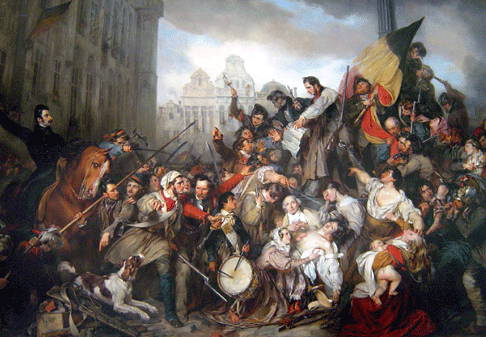13 Apr 2011
Still Dangerous After 181 Years?
The new brochure of the 2011-2012 season at Paris’ Opéra-Comique has only arrived in the past few days and has already caused a stir in two countries.

The new brochure of the 2011-2012 season at Paris’ Opéra-Comique has only arrived in the past few days and has already caused a stir in two countries.
Most Parisians know the name of the composer Auber only as the name of a metro stop near the Palais Garnier. But Daniel François Esprit Auber (1782-1871) was the most performed French opera composer in the 19th Century and his opera La Muette de Portici (The Mute Girl of Portici) has an important history. The fact that this opera is in the season at the Opera-Comique next year, from the 3rd to the 21st of April, has caused a minor sensation.
When performed in Brussels in 1830, two years after its debut at the Paris Opéra, it was already a European favorite and had established the new genre, “Grand Opera.” The libretto, by Auber’s long-time collaborator, Eugène Scribe, is the story of an abortive attempt by the city of Naples to revolt against Spanish rule. While the chorus represents the oppressed populace, it was actually the duet “Amour sacré de la patrie” ( “Sacred Love of the Homeland”) that caused a riot in the hall. As every Belgian child knows, this immediately became the anthem of the revolution against their Dutch rulers and, some months later, Belgium was an independent country.
What turned heads was the tiny print in the Opéra-Comique brochure indicating that this opera was a co-production with “Théâtre Royal de la Monnaie” — Belgium’s principal opera in the capitol of Brussels, also known as “Koninklijke Muntschouwburg (de Munt)” in the Dutch language. (The opera is located in an area where money was minted in earlier times.) The La Monnaie orchestra will actually be in the pit and the conductor is Patrick Davin, another Belge.
Belgium was annexed by France in 1797, given over to Holland with the fall of Napoleon in 1815 but freed itself of Dutch rule in 1831. It is a parliamentary democracy with a monarch (now Albert II) with limited powers. In 1971, as a result of conflict between the two principal regions, a new confederation of three semi-autonomous regions was created: Dutch speaking Flanders in the north, French-speaking Wallonia in the south with the city of Brussels — mostly French speaking but physically in the area of Flanders — a third region. This federation was created to resolve the political conflicts between the two language regions of Belgium in the 1960s.
 Episodes from September Days 1830 on the Place de l'Hôtel de Ville in Brussels by Gustave Wappers (1803-1874) [Source: Wikipedia]
Episodes from September Days 1830 on the Place de l'Hôtel de Ville in Brussels by Gustave Wappers (1803-1874) [Source: Wikipedia]
These historic conflicts are again a factor in Belgium politics and there are even proponents of dividing the country in two. As a result of these conflicts, Belgium has been unable to form a new government since the last fell in June, 2010 (the previous government remains as a caretaker.) The stalemate marks the longest any state in history has been without a government and many young people, who refuse to accept that Belgium cannot stay united, are protesting. A recent “Nude-in” by students was well-covered by the European media and there is now a Facebook group demanding a new staging of this historic Auber opera.
In any case, this is a political hot potato and an April 7 article in the major Brussels newspaper, La Libre — entitled “‘La Muette de Portici’ Oui, mais pas ici!” (“The Mute Girl of Portici? Yes, but not here!”) the reporter asked a wary Peter De Caluwe, the La Monnaie boss, about his role in this project. De Caluwe, obviously ducking the political issue, spoke of conversations with Jérôme Deschamps who heads the Opéra-Comique. When Dechamps proposed a co-production of an opera by Adolphe Adam, De Caluwe, “amused,” suggested La Muette de Portici instead and Deschamps, unexpectedly, ran with that suggestion, now soliciting a third co-producer: the Teatro San Carlo in Naples. The production will be by Emma Dante, the Sicilian director who staged the politically edgy Carmen of Bizet opening the La Scala season in December of 2009.
The La Libre article concludes: “There is no date planned then for this production on the stage at La Monnaie: nothing before 2015. By that time, we should have a government and, if everything goes well, still a Belgium.”
Frank Cadenhead
Click here for Jan Necker’s article on La Muette de Portici.